#adjectiveclause
Text
Noun-Modifying (Adjective) Clauses

Noun-Modifying (adjective) Clauses
(Forms and Functions of Subordinate Clauses)
Subordinate clauses can be classified into three main forms based on their functions within a sentence: nominal clauses, noun-modifying (adjective) clauses, and adverbial clauses.
Nominal Clauses (Substantive Clauses):
These clauses function as nouns within a sentence.
They can serve as the subject, object, or complement of a sentence.
Example:
What he said surprised everyone.
(Nominal clause as the subject)
Noun-Modifying Clauses (Adjective Clauses):
These clauses provide additional information about a noun in the main clause.
They are introduced by relative pronouns (e.g., who, which, that).
Example:
The book that I borrowed from the library is fascinating.
(Relative clause providing information about the book)
Adverbial Clauses:
These clauses function as adverbs, modifying the main clause by providing information about time, place, manner, condition, etc.
They are introduced by subordinating conjunctions (e.g., because, although, when, while).
Example:
Although it was raining, they decided to go for a walk.
(Adverbial clause indicating a contrasting condition)
Adjective Clauses:
Noun-Modifying Clauses, also known as Adjective Clauses, are dependent clauses that function as adjectives in a sentence.
These clauses provide additional information about a noun in the main clause.
It typically begins with a relative pronoun (such as who, whom, whose, which, or that) or a relative adverb (such as where, when, or why).
Adjective clauses modify, or describe, a specific noun in the main clause.
They add details that help to identify or specify the noun more clearly.
Example:
The girl who is wearing a red dress is my sister.
The book that was on the shelf is now missing.
Adjective clauses provide additional information that is often essential for a complete understanding of the noun they modify.
Example:
I know a person whose brother is a famous actor.
Do you see the house where they used to live?
Adjective clauses can serve to identify or restrict the noun they modify.
They specify which person, thing, or place is being referred to.
Example:
The students who completed the assignment early will receive extra credit.
The car that is parked outside belongs to my neighbour.
Adjective clauses are flexible and can be positioned immediately after the noun they modify or at the end of the sentence.
Example:
The woman, who is my aunt, is a talented artist.
The dog found the bone in the garden, which had been buried there by the children.
Adjective clauses are introduced by relative pronouns (who, whom, whose, which, that) or relative adverbs (where, when, why), which connect them to the noun in the main clause.
Example:
This is the place where I first met her.
The person whom you recommended has been hired.
Noun/Pronoun Modifying Clauses Types:
Various types of clauses, including relative clauses, participle clauses, finite noun clauses (appositives), infinitive clauses, and infinitive noun clauses, modify nouns and pronouns:
Relative Clauses:
Relative clauses are dependent clauses that provide additional information about a noun in the main clause.
They are introduced by relative pronouns (who, whom, whose, which, that) or relative adverbs (where, when, why).
Example:
The man who is standing over there is my neighbour.
The book that I borrowed from the library is fascinating.
Participle Clauses:
Participle clauses are clauses that use present participles (-ing) or past participles (-ed, -en) to modify a noun.
They often convey simultaneous or prior action.
Example:
The girl, smiling warmly, greeted us at the door.
The car, damaged in the accident, was towed away.
Finite Noun Clauses (Appositives):
Finite noun clauses, also known as appositives, function as modifiers and provide additional information about a noun.
They are finite clauses with a subject and a verb.
Example:
She believes that he will arrive soon.
Our hope, that the team will win, is strong.
Infinitive Clauses:
Infinitive clauses use the base form of a verb (to + verb) to modify a noun.
They often express purpose, intent, or result.
Example:
He designed a website for users to navigate easily.
We set up a cozy corner for the children to relax.
Infinitive Noun Clauses:
Infinitive noun clauses function as nouns and are formed with an infinitive (to + verb) as the main element.
Example:
His dream is to travel around the world.
The goal of the project is to improve communication.
Key Differences between
Infinitive Clauses and Infinitive Noun Clauses:
Function:
Infinitive Clauses: Can function as adjectives, adverbs, or nouns.
Infinitive Noun Clauses: Specifically function as nouns.
Role:
Infinitive Clauses: Provide additional information about an action, purpose, or result.
Infinitive Noun Clauses: Act as subjects, objects, or complements, playing the role of a noun in the sentence.
Examples:
Infinitive Clauses:
to buy groceries, to navigate easily
Infinitive Noun Clauses:
to finish the project by Friday, to travel around the world
Noun-Modifying (Adjective) Clauses
Nominal (Noun) Clauses
Complex Sentences
Subordinate Clauses
Types of Interrogative Sentences
What is a Noun? How to use it?
Read the full article
#adjectiveclauses#finitenounclauses#independentclauses#infinitiveclauses#infinitivenounclauses#noun-modifyingclauses#participleclauses#relativeclauses#subordinateclauses
0 notes
Photo
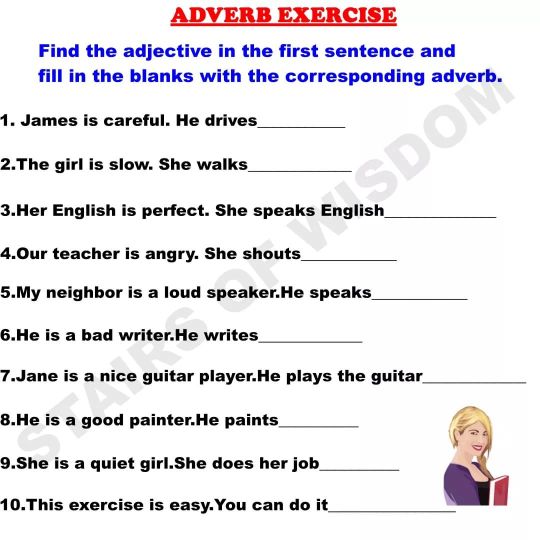
Adverb exercise #adverb #englishonline #Vocabulary #vocabularywords #Vocabulary #englush_learning #englishonline #englishtips #englishvocabulary #englishteacher #englishlanguage #englishgrammar #Englighprepration #ssc #banking #upsc #lessonoenglish #englishlesson #ieltstips #ieltsexam #ielts_speaking #ieltspreparation #adverbclause #nounclause #conjunction #relativepronouns #adjectiveclause #nounclause #adverbclauses #Superfluous (at Dehradun The City Of Love) https://www.instagram.com/p/ChhgTKcp_ci/?igshid=NGJjMDIxMWI=
#adverb#englishonline#vocabulary#vocabularywords#englush_learning#englishtips#englishvocabulary#englishteacher#englishlanguage#englishgrammar#englighprepration#ssc#banking#upsc#lessonoenglish#englishlesson#ieltstips#ieltsexam#ielts_speaking#ieltspreparation#adverbclause#nounclause#conjunction#relativepronouns#adjectiveclause#adverbclauses#superfluous
0 notes
Photo

Pagi ini diisi dg koreksi tugas siswa dan menulis pesan2 untuk siswa berkebutuhan khusus 😜 My dear students, Push yourself to study because no one else can do it for you. Percoyo wis karo gurumu sing lemu iki. Ora ono rugine wong sing sregep sinau 😎❤ #pesancinta #englishclass #englishsubject #englishteachers #noteformystudents #education #educating #learningEnglishGrammar #adjectiveclause (at Sman 12 Kabupaten Tangerang)
#englishteachers#adjectiveclause#pesancinta#educating#englishclass#noteformystudents#englishsubject#learningenglishgrammar#education
0 notes
Text
Parallelism in English Grammar
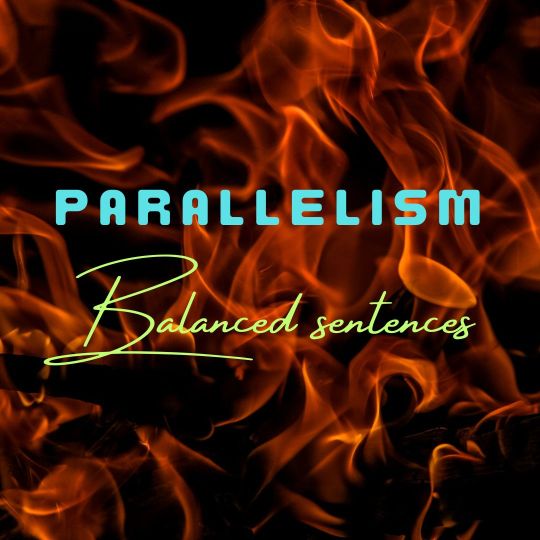
Crafting Balanced sentences-Parallelism
In English grammar, the phenomenon where similar or parallel elements within a sentence are presented with a balanced and harmonious structure is called parallelism.
It involves using the same grammatical form or structure for items in a list, a series, or a comparison to enhance clarity, coherence, and overall readability.
Parallelism is often achieved through the use of coordinating conjunctions and correlative conjunctions, as well as by ensuring consistent grammatical structures for the elements involved.
Parallelism is a key concept when it comes to balancing elements in a sentence, especially with regard to nouns, verbs, and other grammatical structures.
Nouns:
The conference covered topics such as artificial intelligence, machine learning, and data analytics.
Explanation: In this sentence, the parallel nouns artificial intelligence, machine learning, and data analytics share a similar structure, contributing to the balanced construction of the sentence.
Verbs:
He likes to run, jump, and play.
Explanation: The verbs run, jump, and play are parallel in structure.
Adjectives:
The room was cozy, warm, and inviting.
Explanation: The parallel adjectives cozy, warm, and inviting have a consistent structure, describing the room in a harmonious way.
Adverbs:
She completed the task quickly, efficiently, and accurately.
Explanation: The adverbs quickly, efficiently, and accurately are parallel, describing how she completed the task.
Prepositional Phrases:
He excels in leadership, in teamwork, and in problem-solving.
Explanation: The prepositional phrases in leadership, in teamwork, and in problem-solving are parallel, highlighting areas of excellence.
Parallel Gerunds:
They enjoy swimming, hiking, and biking.
Explanation: The parallel gerunds swimming, hiking, and biking maintain a consistent structure within the sentence.
Parallel Infinitives:
She decided to read, to study, and to relax.
Explanation: The parallel infinitives to read, to study, and to relax share a similar structure, contributing to the overall parallelism of the sentence.
Parallel Adverbs:
She spoke confidently, clearly, and persuasively.
Explanation: The parallel adverbs confidently, clearly, and persuasively maintain a consistent structure, describing how she spoke.
Parallel Clauses in a Sentence:
Parallelism is also crucial when dealing with clauses in a sentence.
Clauses are groups of words that contain both a subject and a predicate.
Here are examples of parallelism with clauses:
Independent Clauses:
She enjoys hiking in the mountains, swimming in the ocean, and reading by the fireplace.
In this case, the independent clauses hiking in the mountains, swimming in the ocean, and reading by the fireplace are parallel, contributing to a balanced list of activities.
Dependent Clauses:
Because she wanted to succeed, Mary devoted extra hours to studying, sought help from tutors, and collaborated with classmates on challenging assignments.
In this sentence, the parallel dependent clauses: Mary devoted extra hours to studying, she sought help from tutors, she collaborated with classmates on challenging assignments. They share a similar structure and contribute to the parallelism in the sentence.
Adjective Clauses:
The student who is diligent, who is responsible, and who is motivated will excel in any class.
The adjective clauses who is diligent, who is responsible, and who is motivated are parallel, describing qualities of the student.
Adverbial Clauses:
She completed the assignment as quickly as possible, as efficiently as possible, and as accurately as possible.
The adverbial clauses as quickly as possible, as efficiently as possible, and as accurately as possible are parallel, describing how she completed the assignment.
The Art of Using Conjunctions to Create Harmony in Sentences:
Coordinating conjunctions and correlative conjunctions play a significant role in achieving parallelism in sentences.
Let's delve a bit deeper into how these conjunctions contribute to maintaining parallel structure:
Coordinating Conjunctions
(e.g., and, or, but, nor, for, so, yet):
Example: She likes to hike, swim, and read.
The coordinating conjunction and helps connect and coordinate the parallel elements hike, swim, and read in the sentence.
Example: He can either run or cycle to work.
The coordinating conjunction or connects and coordinates the parallel actions run and cycle.
Correlative Conjunctions
(e.g., both...and, either...or, neither...nor, not only...but also):
Example: Both the cat and the dog enjoy the sunny weather.
The correlative conjunction both...and pairs and coordinates the parallel subjects the cat and the dog.
Example: She is not only diligent but also resourceful.
The correlative conjunction not only...but also pairs and coordinates the parallel adjectives diligent and resourceful.
By using coordinating conjunctions, you can connect elements of the same type in a sentence, creating a sense of balance and parallelism.
Correlative conjunctions, on the other hand, work in pairs to emphasize and coordinate parallel elements.
These conjunctions are crucial tools for writers seeking to maintain a consistent and harmonious structure in their sentences.
Parallelism in English Grammar
What is Adverbial Modifier of a Sentence
What is the Attribute of a Sentence?
What is The Object of a Sentence?
Subject-Verb Agreement in English
Read the full article
#aseries#adjectiveclauses#adjectives#adverbialclauses#adverbs#conjunction#coordinating#correlative#dependentclauses#elements#form#gerunds#grammar#inalist#independentclauses#infinitives#nouns#parallel#prepositionalphrases#structure#syntax#thesame#verbs
0 notes
Photo

#vocabulary #englishonline #Vocabulary #vocabularywords #Vocabulary #englush_learning #englishonline #englishtips #englishvocabulary #englishteacher #englishlanguage #englishgrammar #Englighprepration #ssc #banking #upsc #lessonoenglish #englishlesson #ieltstips #ieltsexam #ielts_speaking #ieltspreparation #adverbclause #nounclause #conjunction #relativepronouns #adjectiveclause #nounclause #adverbclauses #Superfluous (at Dehradun The City Of Love) https://www.instagram.com/p/Chb2qa0LYsy/?igshid=NGJjMDIxMWI=
#vocabulary#englishonline#vocabularywords#englush_learning#englishtips#englishvocabulary#englishteacher#englishlanguage#englishgrammar#englighprepration#ssc#banking#upsc#lessonoenglish#englishlesson#ieltstips#ieltsexam#ielts_speaking#ieltspreparation#adverbclause#nounclause#conjunction#relativepronouns#adjectiveclause#adverbclauses#superfluous
0 notes
Photo

#ieltstips #englishonline #Vocabulary #vocabularywords #Vocabulary #englush_learning #englishonline #englishtips #englishvocabulary #englishteacher #englishlanguage #englishgrammar #Englighprepration #ssc #banking #upsc #lessonoenglish #englishlesson #ieltstips #ieltsexam #ielts_speaking #ieltspreparation #adverbclause #nounclause #conjunction #relativepronouns #adjectiveclause #nounclause #adverbclauses #Superfluous (at Dehradun The City Of Love) https://www.instagram.com/p/ChXLGejJQCt/?igshid=NGJjMDIxMWI=
#ieltstips#englishonline#vocabulary#vocabularywords#englush_learning#englishtips#englishvocabulary#englishteacher#englishlanguage#englishgrammar#englighprepration#ssc#banking#upsc#lessonoenglish#englishlesson#ieltsexam#ielts_speaking#ieltspreparation#adverbclause#nounclause#conjunction#relativepronouns#adjectiveclause#adverbclauses#superfluous
0 notes
Photo

Adverb or Adjective ? #Adjectives #englishonline #Vocabulary #vocabularywords #Vocabulary #englush_learning #englishonline #englishtips #englishvocabulary #englishteacher #englishlanguage #englishgrammar #Englighprepration #ssc #banking #upsc #lessonoenglish #englishlesson #ieltstips #ieltsexam #ielts_speaking #ieltspreparation #adverbclause #nounclause #conjunction #relativepronouns #adjectiveclause #nounclause #adverbclauses #Superfluous (at Amritsar, Punjab) https://www.instagram.com/p/CgHWPFQLpot/?igshid=NGJjMDIxMWI=
#adjectives#englishonline#vocabulary#vocabularywords#englush_learning#englishtips#englishvocabulary#englishteacher#englishlanguage#englishgrammar#englighprepration#ssc#banking#upsc#lessonoenglish#englishlesson#ieltstips#ieltsexam#ielts_speaking#ieltspreparation#adverbclause#nounclause#conjunction#relativepronouns#adjectiveclause#adverbclauses#superfluous
0 notes
Photo

Vocabulary with mnemonic #englishonline #Vocabulary #vocabularywords #Vocabulary #englush_learning #englishonline #englishtips #englishvocabulary #englishteacher #englishlanguage #englishgrammar #Englighprepration #ssc #banking #upsc #lessonoenglish #englishlesson #ieltstips #ieltsexam #ielts_speaking #ieltspreparation #adverbclause #nounclause #conjunction #relativepronouns #adjectiveclause #nounclause #adverbclauses #Superfluous (at Amritsar, Punjab) https://www.instagram.com/p/CgHD01_L5R7/?igshid=NGJjMDIxMWI=
#englishonline#vocabulary#vocabularywords#englush_learning#englishtips#englishvocabulary#englishteacher#englishlanguage#englishgrammar#englighprepration#ssc#banking#upsc#lessonoenglish#englishlesson#ieltstips#ieltsexam#ielts_speaking#ieltspreparation#adverbclause#nounclause#conjunction#relativepronouns#adjectiveclause#adverbclauses#superfluous
0 notes
Photo
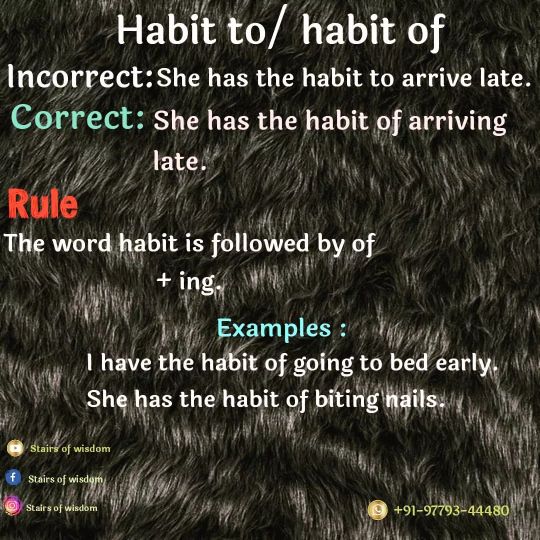
Habit to / Habit of #Adjectives #englishonline #Vocabulary #vocabularywords #Vocabulary #englush_learning #englishonline #englishtips #englishvocabulary #englishteacher #englishlanguage #englishgrammar #Englighprepration #ssc #banking #upsc #lessonoenglish #englishlesson #ieltstips #ieltsexam #ielts_speaking #ieltspreparation #adverbclause #nounclause #conjunction #relativepronouns #adjectiveclause #nounclause #adverbclauses #Superfluous (at Amritsar, Punjab) https://www.instagram.com/p/CgE2XoHpqrr/?igshid=NGJjMDIxMWI=
#adjectives#englishonline#vocabulary#vocabularywords#englush_learning#englishtips#englishvocabulary#englishteacher#englishlanguage#englishgrammar#englighprepration#ssc#banking#upsc#lessonoenglish#englishlesson#ieltstips#ieltsexam#ielts_speaking#ieltspreparation#adverbclause#nounclause#conjunction#relativepronouns#adjectiveclause#adverbclauses#superfluous
0 notes
Photo

Degree of comparison #Adjectives #englishonline #Vocabulary #vocabularywords #Vocabulary #englush_learning #englishonline #englishtips #englishvocabulary #englishteacher #englishlanguage #englishgrammar #Englighprepration #ssc #banking #upsc #lessonoenglish #englishlesson #ieltstips #ieltsexam #ielts_speaking #ieltspreparation #adverbclause #nounclause #conjunction #relativepronouns #adjectiveclause #nounclause #adverbclauses #Superfluous (at Amritsar, Punjab) https://www.instagram.com/p/CgEJ--wLvh-/?igshid=NGJjMDIxMWI=
#adjectives#englishonline#vocabulary#vocabularywords#englush_learning#englishtips#englishvocabulary#englishteacher#englishlanguage#englishgrammar#englighprepration#ssc#banking#upsc#lessonoenglish#englishlesson#ieltstips#ieltsexam#ielts_speaking#ieltspreparation#adverbclause#nounclause#conjunction#relativepronouns#adjectiveclause#adverbclauses#superfluous
0 notes
Photo
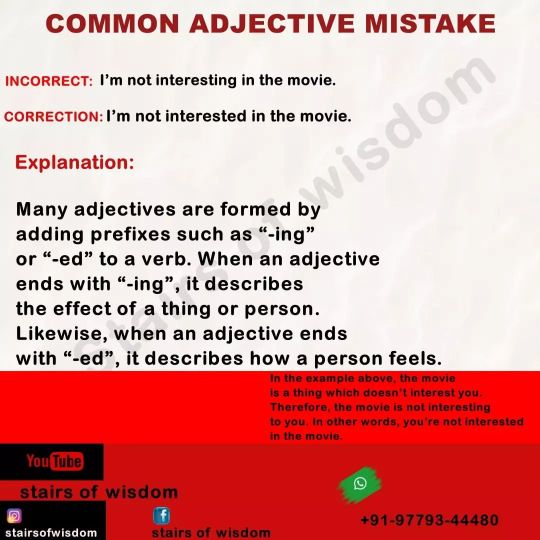
Common adjective mistakes #Adjectives #englishonline #Vocabulary #vocabularywords #Vocabulary #englush_learning #englishonline #englishtips #englishvocabulary #englishteacher #englishlanguage #englishgrammar #Englighprepration #ssc #banking #upsc #lessonoenglish #englishlesson #ieltstips #ieltsexam #ielts_speaking #ieltspreparation #adverbclause #nounclause #conjunction #relativepronouns #adjectiveclause #nounclause #adverbclauses #Superfluous (at Amritsar, Punjab) https://www.instagram.com/p/CgD-m5BrqW0/?igshid=NGJjMDIxMWI=
#adjectives#englishonline#vocabulary#vocabularywords#englush_learning#englishtips#englishvocabulary#englishteacher#englishlanguage#englishgrammar#englighprepration#ssc#banking#upsc#lessonoenglish#englishlesson#ieltstips#ieltsexam#ielts_speaking#ieltspreparation#adverbclause#nounclause#conjunction#relativepronouns#adjectiveclause#adverbclauses#superfluous
0 notes
Photo
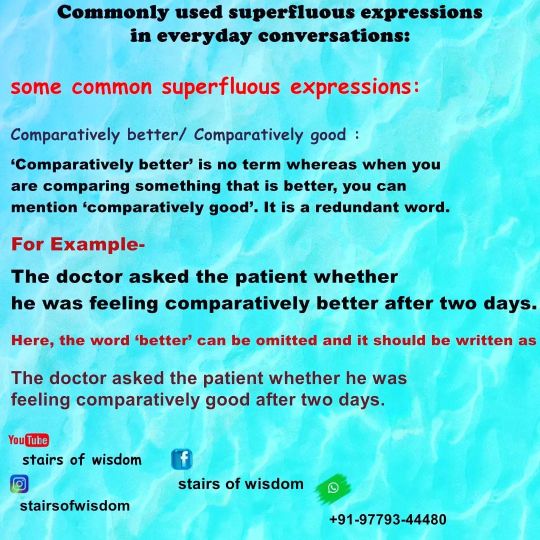
Superfluous words #englishonline #Vocabulary #vocabularywords #Vocabulary #englush_learning #englishonline #englishtips #englishvocabulary #englishteacher #englishlanguage #englishgrammar #Englighprepration #ssc #banking #upsc #lessonoenglish #englishlesson #ieltstips #ieltsexam #ielts_speaking #ieltspreparation #adverbclause #nounclause #conjunction #relativepronouns #adjectiveclause #nounclause #adverbclauses #Superfluous (at Amritsar, Punjab) https://www.instagram.com/p/Cf_0D21J-Dj/?igshid=NGJjMDIxMWI=
#englishonline#vocabulary#vocabularywords#englush_learning#englishtips#englishvocabulary#englishteacher#englishlanguage#englishgrammar#englighprepration#ssc#banking#upsc#lessonoenglish#englishlesson#ieltstips#ieltsexam#ielts_speaking#ieltspreparation#adverbclause#nounclause#conjunction#relativepronouns#adjectiveclause#adverbclauses#superfluous
0 notes
Photo

PHRASAL VERB #englishonline #Vocabulary #vocabularywords #Vocabulary #englush_learning #englishonline #englishtips #englishvocabulary #englishteacher #englishlanguage #englishgrammar #Englighprepration #ssc #banking #upsc #lessonoenglish #englishlesson #ieltstips #ieltsexam #ielts_speaking #ieltspreparation #adverbclause #nounclause #conjunction #relativepronouns #adjectiveclause #nounclause #Adverbclause (at Amritsar, Punjab) https://www.instagram.com/p/CfgG3kyrQIp/?igshid=NGJjMDIxMWI=
#englishonline#vocabulary#vocabularywords#englush_learning#englishtips#englishvocabulary#englishteacher#englishlanguage#englishgrammar#englighprepration#ssc#banking#upsc#lessonoenglish#englishlesson#ieltstips#ieltsexam#ielts_speaking#ieltspreparation#adverbclause#nounclause#conjunction#relativepronouns#adjectiveclause
0 notes
Photo

PHRASAL VERB #englishonline #Vocabulary #vocabularywords #Vocabulary #englush_learning #englishonline #englishtips #englishvocabulary #englishteacher #englishlanguage #englishgrammar #Englighprepration #ssc #banking #upsc #lessonoenglish #englishlesson #ieltstips #ieltsexam #ielts_speaking #ieltspreparation #adverbclause #nounclause #conjunction #relativepronouns #adjectiveclause #nounclause #Adverbclause (at Amritsar, Punjab) https://www.instagram.com/p/CfeG2HrpE5g/?igshid=NGJjMDIxMWI=
#englishonline#vocabulary#vocabularywords#englush_learning#englishtips#englishvocabulary#englishteacher#englishlanguage#englishgrammar#englighprepration#ssc#banking#upsc#lessonoenglish#englishlesson#ieltstips#ieltsexam#ielts_speaking#ieltspreparation#adverbclause#nounclause#conjunction#relativepronouns#adjectiveclause
0 notes
Photo

PHRASAL VERB #englishonline #Vocabulary #vocabularywords #Vocabulary #englush_learning #englishonline #englishtips #englishvocabulary #englishteacher #englishlanguage #englishgrammar #Englighprepration #ssc #banking #upsc #lessonoenglish #englishlesson #ieltstips #ieltsexam #ielts_speaking #ieltspreparation #adverbclause #nounclause #conjunction #relativepronouns #adjectiveclause #nounclause #adverbclauses (at Amritsar, Punjab) https://www.instagram.com/p/CfeGl5AJFBC/?igshid=NGJjMDIxMWI=
#englishonline#vocabulary#vocabularywords#englush_learning#englishtips#englishvocabulary#englishteacher#englishlanguage#englishgrammar#englighprepration#ssc#banking#upsc#lessonoenglish#englishlesson#ieltstips#ieltsexam#ielts_speaking#ieltspreparation#adverbclause#nounclause#conjunction#relativepronouns#adjectiveclause#adverbclauses
0 notes
Photo

PHRASAL VERB #englishonline #Vocabulary #vocabularywords #Vocabulary #englush_learning #englishonline #englishtips #englishvocabulary #englishteacher #englishlanguage #englishgrammar #Englighprepration #ssc #banking #upsc #lessonoenglish #englishlesson #ieltstips #ieltsexam #ielts_speaking #ieltspreparation #adverbclause #nounclause #conjunction #relativepronouns #adjectiveclause #nounclause #adverbclause (at Amritsar, Punjab) https://www.instagram.com/p/CfeGFzIJIc0/?igshid=NGJjMDIxMWI=
#englishonline#vocabulary#vocabularywords#englush_learning#englishtips#englishvocabulary#englishteacher#englishlanguage#englishgrammar#englighprepration#ssc#banking#upsc#lessonoenglish#englishlesson#ieltstips#ieltsexam#ielts_speaking#ieltspreparation#adverbclause#nounclause#conjunction#relativepronouns#adjectiveclause
0 notes